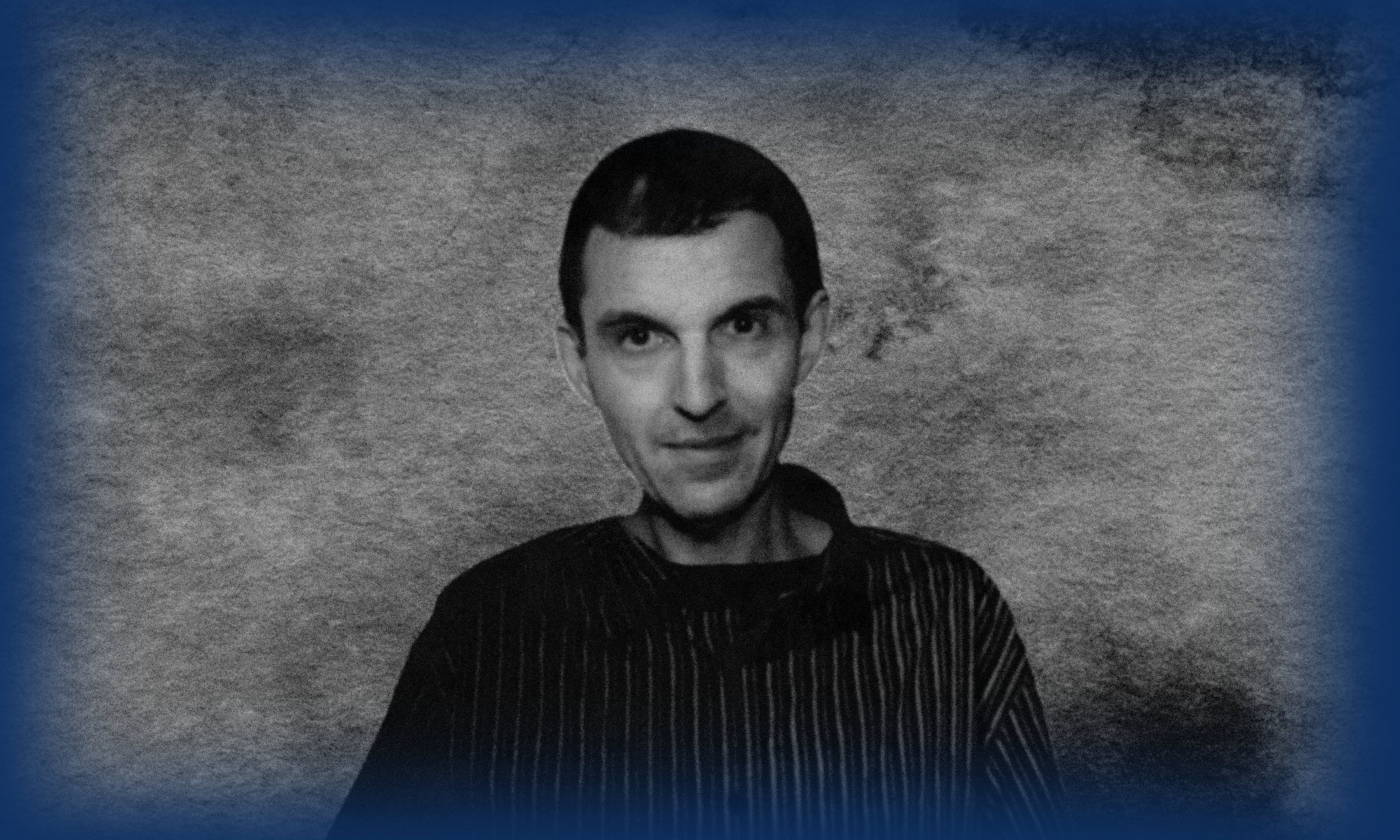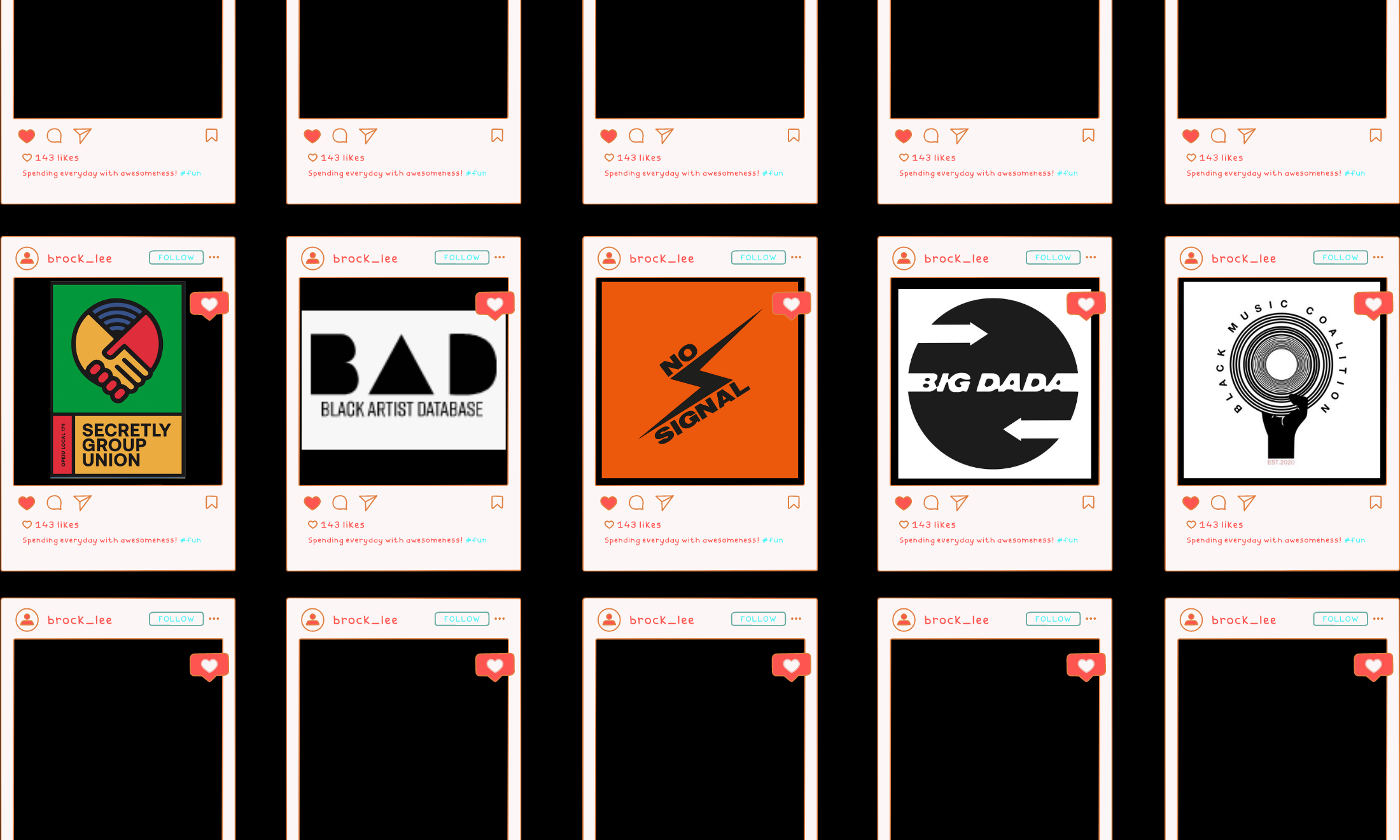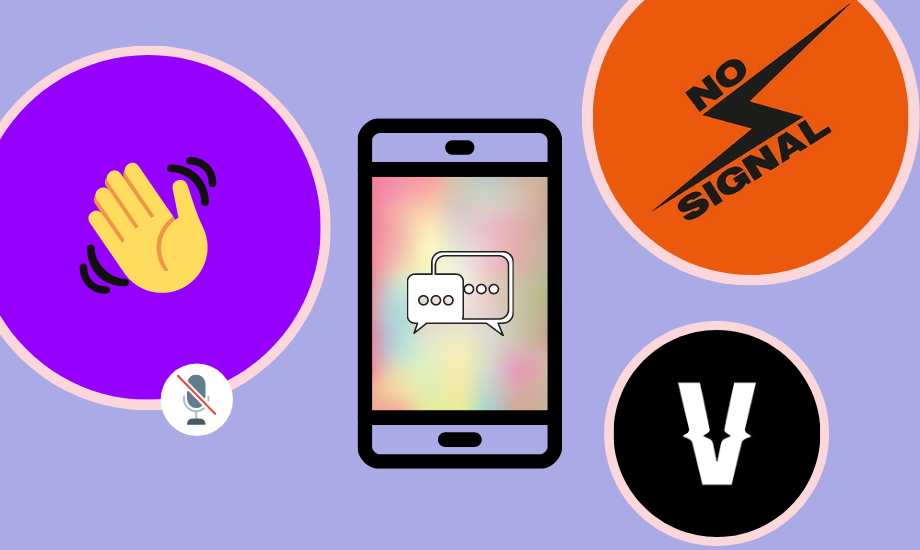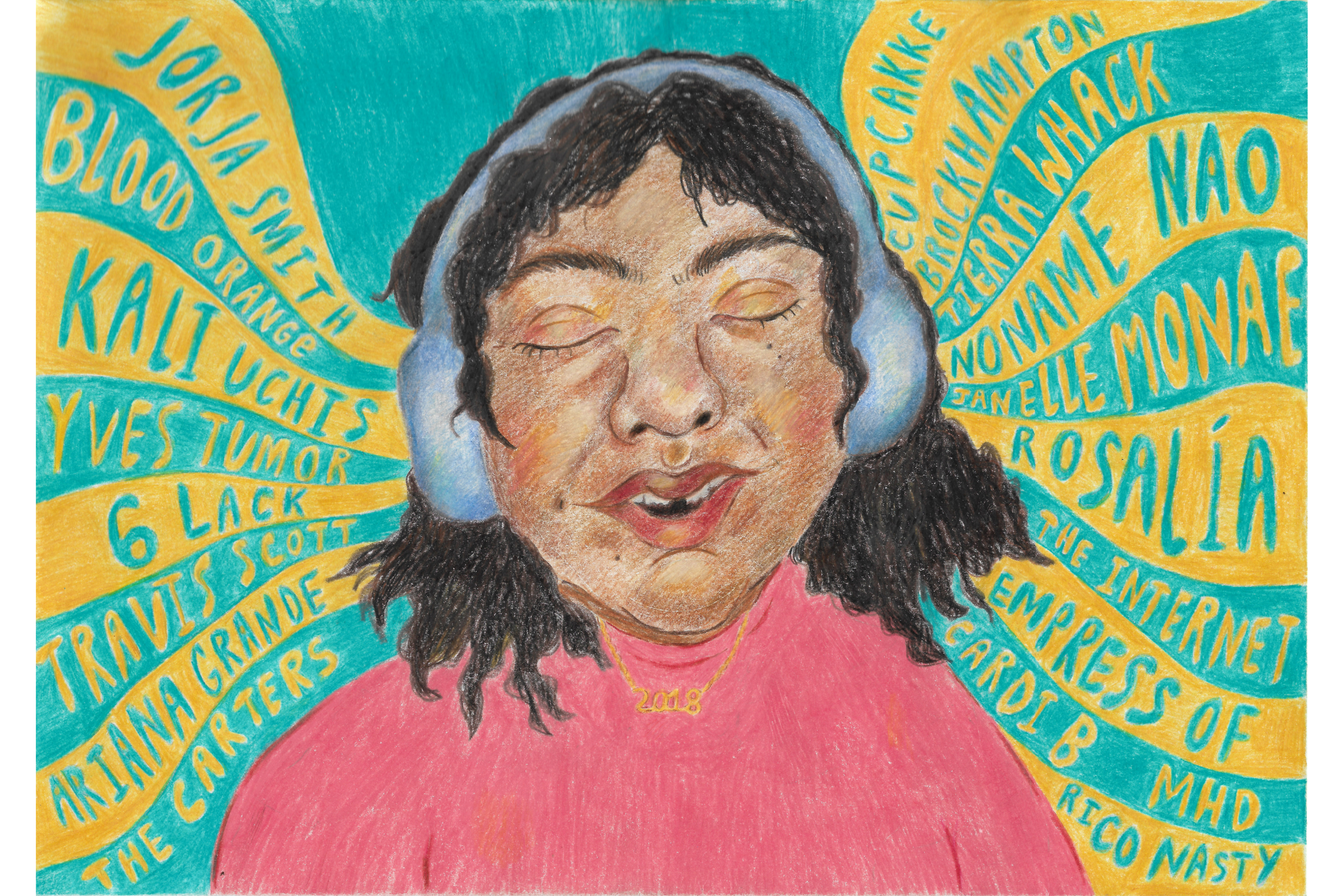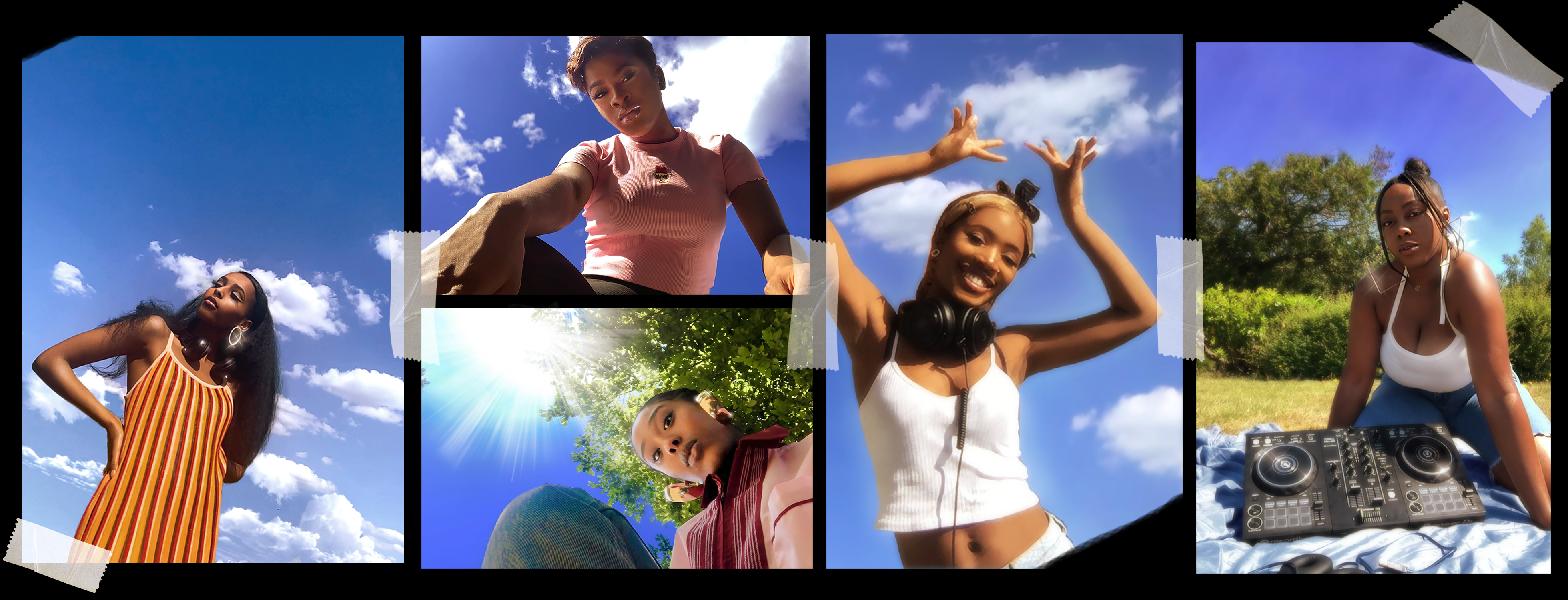
Photography by Nwaka Okparaeke (@by_nwaka)
The women of No Signal radio say their piece
From production and advertising to presenting and DJing, women are involved at all levels of the station that’s revolutionising the black British music scene. Natty Kasambala speaks to them about No Signal’s growth, inclusivity and the freedom of being able to revel in their blackness at work.
Natty Bakhita Kasambala
29 May 2020
It can be hard to keep up with the rapid pace of events unfolding during lockdown. Though the outside world remains fairly still, with more time on our hands to express the thoughts in our heads, the cultural discourse feels dense and chaotic. But one topic that has managed to cut through the noise is No Signal, the DIY black radio station that found its feet in the midst of quarantine and has become the unifying soundtrack to our nights stuck indoors as we wait for “normality” to resume.
Powered by Jojo and David Sonubi, No Signal is much like their other projects in its distinction from your average music industry line up. The young, black creative network it calls on and its authentic inclusion of black women at all levels, both on and off the virtual stage, are part of its magic. From Henrie Kwushue, presenter, DJ and Head of Production, to Ghadir Mustapha, who helps playlist the show alongside her job at XL Recordings, it’s clear that the station has become a place to not only elevate some of the more seasoned voices in the scene but also to usher in a new wave of industry talent. Shingi Sibanda for instance, who works on playlists with Ghadir, came on board alongside her job helping young people from under-represented communities gain access to the industry.
For the first time since its phenomenal rise, we hear from some of the incredible women running the operation.
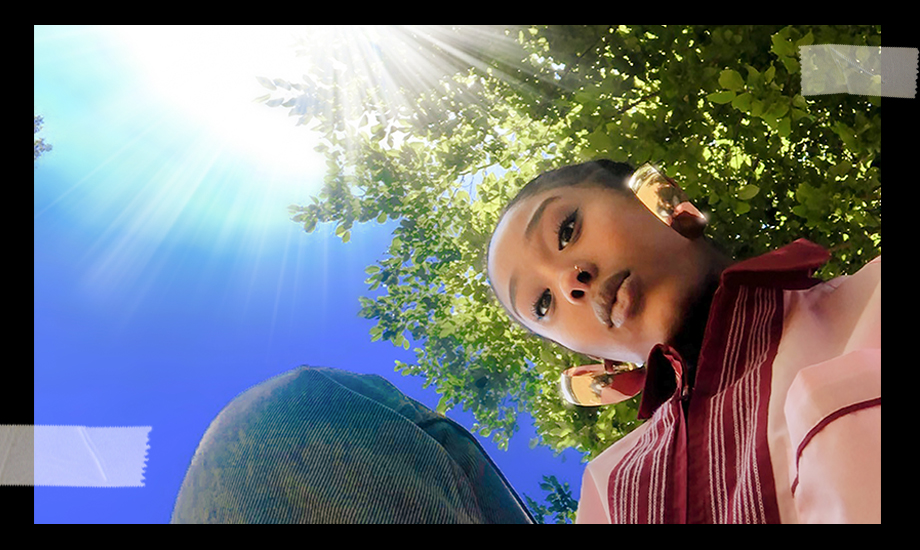
Ghadir Mustapha, shot by Nwaka Okparaeke
“I’ve never had a title before in my life guys, I was more of a freelancer, self-employed type of babe,” explains Henrie of her newfound responsibility, on a group Zoom call with four of the other women from the team. They’re here to discuss their journey so far, the challenges of visibility and the future of black radio. “Boss girl, we love it!” chimes in Huda Ahmed – a long-time team member who works on advertising for the show. Already, the supportive atmosphere amongst the women is clear.
When introducing themselves, every origin story starts with, “I’ve known Jojo for years…” or “I met Jojo at a party…” One of the main perks of his kind of recruitment approach is its ability to widen access and elevate new voices. “There are a lot of us in the team where this has been our introduction into the creative industry. Jojo taught me how to make a deck for the first time,” says Ghadir. NS10v10 producer Jameela Joie excitedly references Issa Rae’s business advice which encourages aspiring creatives to “network across”. “Jojo literally does that, he works across… sometimes even down,” she says. “And on top of that, they listen!” Henrie adds. “And they listen to us!” The ‘us’ here sounds general but means something very deliberate. Ghadir concludes with a quick, breezy, “Shoutout them man!” and there’s a choral laugh.
“Jojo literally does that, he works across… sometimes even down!”
Like many creative industries – radio, although rife with opportunities for exposure, can prove a difficult space to secure sustainable positions, especially for young black women. While strides are being made with youth and diversity-centred specialist stations such as Reprezent Radio and Foundation FM, there are still major hurdles that have historically prevented women in radio from feeling safe and seen (see here: Radar Radio) and black-owned platforms from prevailing without hands-on commercial investment (see here: the closure of Choice FM). But with over 1 million listeners tuning in to their biggest song battle, an official partnership with Spotify and ears in over 99 countries, the show’s content-moving chart sales for artists like Mariah Carey, and radio listening as a whole spiking during lockdown, it’s safe to say that No Signal stands the best chance at implementing what I’d like to dub Black Radio 2.0.
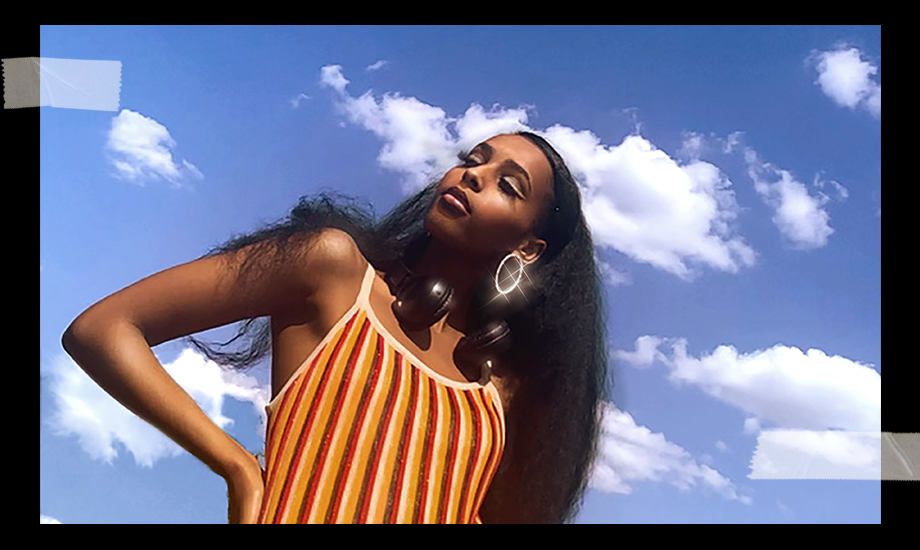
Huda Ahmed, shot by Nwaka Okparaeke
So how long has this all been going on? “[Quarantine] was definitely a kick up the arse,” says Huda. The online radio concept originally launched in April 2019 as Recess’ sister brand, but streams and events were a lot more sporadic then. “It’s mad how we went from 50 listeners max to a million,” marvels Ghadir, but the growth didn’t happen overnight.
Since March, the team have been working with a wealth of black presenters and curators to produce diverse content for the site, gradually upping the frequency of transmissions as popularity grew. But it was the controversial song clash format NS10v10 that catapulted them into the general consciousness. It was inspired by an inquisitive tweet by team member Bola Bankz, who asked the open question on Twitter: “Drake v 50 Cent. 10 songs. Who wins?” and sparked an impassioned debate of people advocating both sides. The potential, spotted and developed by Jojo, now sees two representatives select 10 songs from opposing artists and battle it out in a round-for-round game of strategy and timing.
Jameela racks her brain for the moment she clocked the wave beginning. “I think it was the J Hus and Kojo Funds one, which blew up because J Hus lost and then now, suddenly, we’ve got everyone’s attention,” she says. Ghadir always reckoned her timeline was a No Signal echo chamber, so it was only when it transcended that bubble that she realised how far it was travelling, “When it started trending constantly and people outside the realms of Black Twitter were hitting me up saying ‘yo, you guys’ thing is really taking off!’” Jameela jumps in to add, “I even had one of my trainee teacher friends message me like ‘is that you?!’, one of those moments when your worlds collide and you think ‘oh wow, this is huge’.”
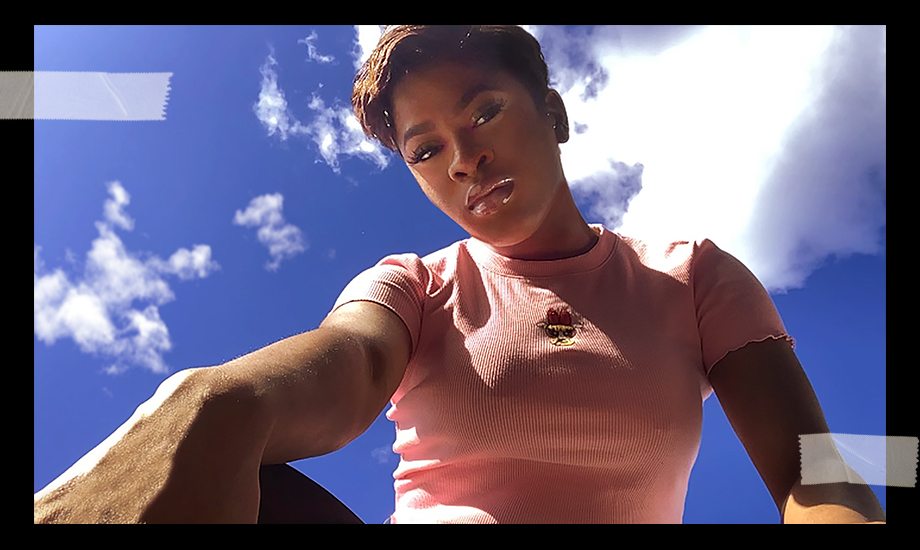
Jameela Joie shot by Nwaka Okparaeke
Now, she’s referring to the clash that saw No Signal break its own records – and briefly its servers – while hosting the hotly-anticipated duel of Wizkid versus Vybz Kartel, an event that activated the diaspora in full force, with Jameela representing Starboy himself. Inevitably when invoking the music of two international giants, each with extremely devoted fanbases, the atmosphere is going to get a little spicy. Once announced, there was a palpable buzz on social media: national flags appeared in bios, memes began to float around and song selections were hypothesised eagerly. Jameela admits, “I knew it was getting out of control from about two days before. I’d already gone on private because it was a lot. A couple hours before the clash I [looked] at my timeline and thought, ‘What the hell did we get ourselves into?’” The idea even crossed her mind of what might happen if she suddenly just ghosted when the clock struck 9pm. But citing her tough skin, she showed up, armed to do Wizkid FC proud, her shakiness undetectable.
“I knew it was getting out of control from about two days before. I’d already gone on private because it was a lot”
With a subject matter as integral as music, identity can be so firmly intertwined that emotions spiral. During the clash, some of the smack talk on and off-air turned personal and narratives nonsensically shifted to paint Jameela in the “Angry Black Woman” stereotype, despite her fairly nonchalant chat. When the claim was made that she was “letting down well-mannered black women”, she firmly flagged the problematic statement while introducing one of her songs. “That’s not something I’m gonna let slide and I will address it on air, so that everybody knows,” she said. Disappointingly – but perhaps unsurprisingly given the volatility of Lockdown Twitter – she was met with significant backlash on social media. During the biggest clash yet for the platform, with a global audience tuned in, her name was soon trending on Twitter right next to the artists’. More baffled by the sensitivity than hurt by the attacks, she elaborates: “I just felt like people were weaponising all these tropes about black women and trying to use that against me in something that is meant to be light-hearted.”
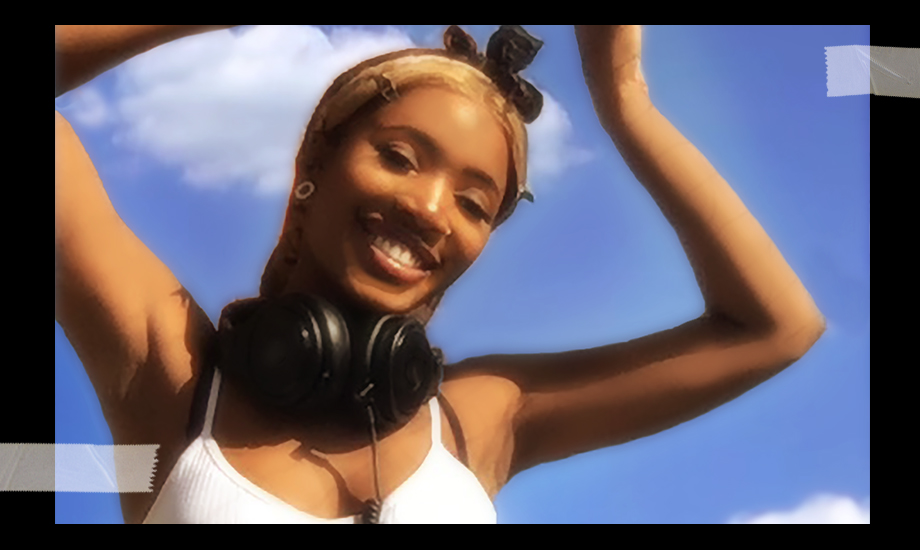
Henrie Kwushue shot by Nwaka Okparaeke
Although it felt like a frustrating end to what was a remarkable cultural feat, it’s one that the team is determined not to let taint their achievements so far. “It was never meant to be West Indies versus Africa, it was genuinely a celebration of all things black, which is what we do every single time,” Henrie clarifies. “And obviously you have people on the fringes in every group who take things too far but the majority were incredible.”
And it’s true. Highlights of the night included Burna Boy live streaming on Insta with his mother as he tuned in – still reeling from his own victory against Popcaan two days prior. There was also a torrent of truly hilarious, good-spirited tweets and praising articles that filtered out over the following days, and the warm feeling of being a part of something amidst a particularly isolating time. At the heart of it, the shared passion for music is the common thread between the squad and enjoyment is a driving force behind all of the programming. In fact, the sentence that you’ll see emboldened on the 10v10 flyer graphics and echoed through the shows is “for entertainment purposes only” because, at the end of the day, that’s what it boils down to.
“No Signal is not just us, it’s part of a wider revolution in media and black media, and London, and the UK, and just the culture”
But that’s not to say that the impact ends there. Alongside the fun and visibility, comes the chance to help break new talent and influence the culture, which is just as exciting for the team of true music fans. “No Signal is not just us, it’s part of a wider revolution in media and black media, and London, and the UK, and just the culture,” Ghadir says giddily. A great example of this is the success story of emerging Congolese artist IDPizzle. His remix of Pop Smoke’s hit ‘Welcome To The Party’ rapidly became a crowd favourite when the song was spun in the NS10v10 show breaks and the standout lyric “billie jin” was everywhere you looked.
Henrie recalls, “I remember it getting played for the first time by Jo and off-air I was like ‘Jo, what are you playing?’ But then after the second or third time, you’re just enjoying it and knowing that everybody else is just as much as you.” People began to demand the song during every show, and after the partnership with Spotify was announced, IDPizzle became the first cover boy for the official NS Radio playlist. At time of writing, the remix sits at over 732,000 streams. Henrie continues enthusiastically, “It’s just incredible to see even the meme culture part of it grow. We’ve taken something that could have just stayed between us guys but has been put on the platform and people are giving it a life of its own.”
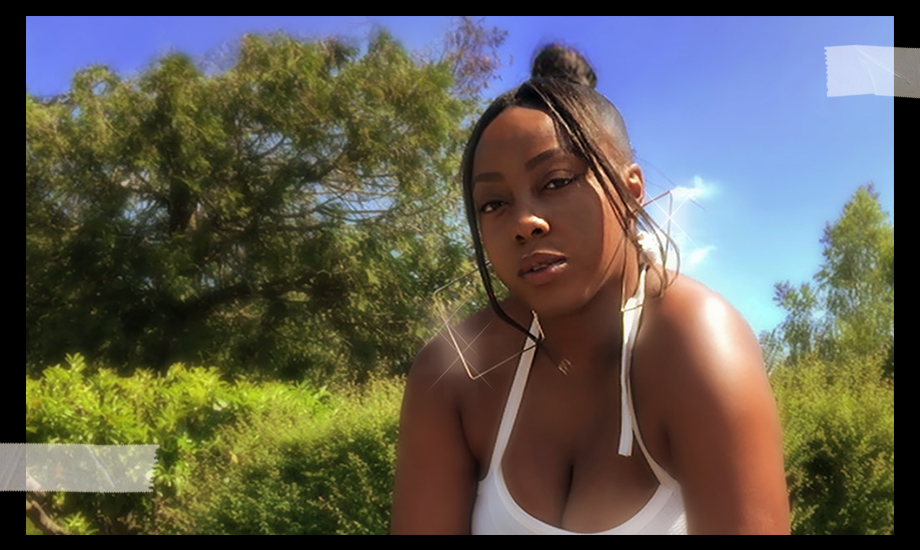
Shingi Sibanda shot by Nwaka Okparaeke
And therein lies the power of having every aspect of this operation, so authentically plugged into its audience and its ethos, to be for us by us: “OG F.U.B.U”, Ghadir chuckles. The station is run by a sprawling network of young black creatives, who are essentially producing the content that they’d want to consume, for their peers, from the ground up – something that is both recognised and deeply appreciated. Huda’s favourite part of No Signal is seeing people just get it, straight off the bat. “It’s so nice when people recognise our mission without us even having to say it,” she says.
She and Ghadir reckon the hashtag #blackradio may have started organically before the team coined it, but either way, it’s clear that it informs everything they do. Shingi underpins this with the comment, “That’s why I will always prefer the term ‘black’ as opposed to ‘urban’, it just feels more direct. And in terms of our voice, I think it means we get to explore the full variety of blackness.” From the types of shows to their hosts, to the people contributing the music, it breeds inclusivity that feels truly refreshing in today’s landscape.
“It’s so nice when people recognise our mission without us even having to say it”
The last burning question is already a tricky one, given how hard it feels to imagine what the world will look like when this strange chapter of our lives eventually closes – but what does the future hold for a platform so perfectly catering to our newfound indoor social lives? The answers are varied and limitless, from visuals to live club nights, but there’s a definite theme of trying to protect something so sacred. “We want to continue to celebrate black radio, culture and sounds and just bring people together on an even bigger scale, however that looks,” affirms Shingi.
Even up until the last episode of NS10v10 Season 1, the potential of the show was still revealing itself. In a friendly between celebrity selectors Ian Wright, repping the 80s, and Julie Adenuga, repping the 90s, the ex-footballer took a moment to speak out against a racist controversy he was in the midst of, clarifying that his silence was intentional because No Signal was where he wanted to address it.
Sparking thoughtful conversations on Twitter, alongside the banging music, Huda hopes this can be the blueprint for how the station can keep growing: “I want us to continue to be that platform where if a black person has something to say and it’s to do with the black community, you can come to No Signal and tell your story because we’ll tell it the way it should be heard.” And then, rest assured, the h’enjoyment will continue.

